Russell “Texas” Bentley returned to The Grayzone alongside regular Toward Freedom contributor Fergie Chambers to detail their experiences documenting the war in the Donbass region. Chambers discussed his recent visit to a dungeon of the Ukrainian state-backed Aidar Battalion, and his interviews with Donetsk-based communists, while Texas described being on the front lines with the Donetsk People’s Republic militia.
Related Articles
Related Articles
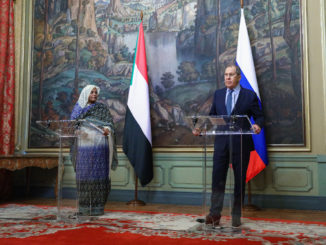
Is Sudan Trying to Blackmail Russia As It Gains a New Partner in the United States?
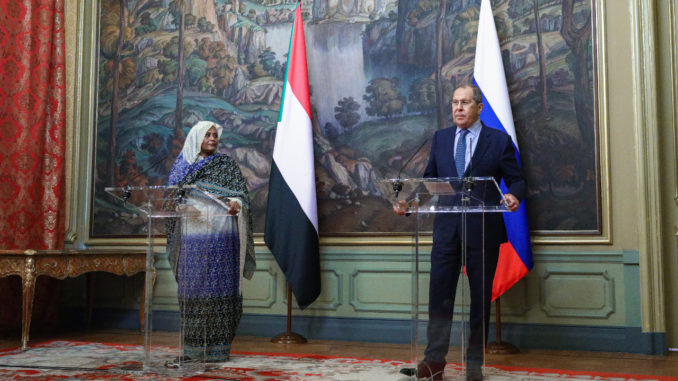
Editor’s Note: The following is the writer’s analysis of Russia-Sudan relations.
Russia’s ambitious plans to establish a naval base in Sudan could soon be thwarted. The northeast African country is reportedly trying to “blackmail” Moscow by demanding a review of a deal allowing construction of a Russian naval facility on Sudan’s Red Sea coast.
In November 2020, the Kremlin announced plans to build a seaport technical facility in the city of Port Sudan, guaranteeing Russia’s first substantial military foothold in Africa since the former Soviet Union was dismantled. The two countries reached a deal that would allow Russia’s navy a 25-year lease in Port Sudan, housing up to four ships and 300 soldiers, in exchange for weapons and military equipment for the northeast African country.
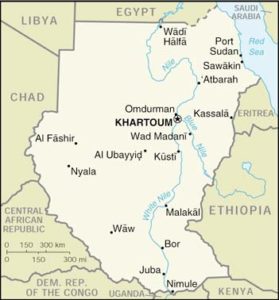
But now, a Russian state news agency, RIA Novosti, reports Sudan wants to re-negotiate the deal. One Russian publication went so far as to call it “blackmail.” In exchange for providing the land for a naval base to Russia, Khartoum reportedly has asked Moscow to arrange payments to the country’s central bank during the first five years of the lease, with the option of extending the deal to 25 years.
The Kremlin has not yet responded to the proposal, although Russian Deputy Foreign Minister Mikhail Bogdanov said the two countries’ militaries continue negotiations on the creation of a naval logistics base for Russian warships in the Red Sea. Sudan’s officials, on the other hand, strongly deny their country has been trying to “blackmail” Moscow.
“It is not true. This news is not true. This is groundless news. The Sudanese side is not asking for any payments in connection with the military base agreement,” said Onur Ahmad Onur, charge d’affaires of Sudan’s embassy in Moscow.
Whether or not Sudan really asked Russia for financial compensation, the Kremlin’s struggle to improve its positions in northeast Africa is unlikely to be an easy one. Back in June, it became obvious Russia could face many obstacles in its attempts to establish a material-technical support facility in the strategically important region located between the Gulf of Aden in the south and the Suez Canal in the north. Such a facility could provide material support in the form of ships and soldiers and technical support in the form of command, control, communication, computer and intelligence operations.
On June 1, Sudanese Armed Forces Chief of Staff Muhammad Usman al-Hussein announced the revision of the agreement. About three weeks later, the Sudanese Minister of Defense Yasin Ibrahim Yasin traveled to Moscow to discuss Russian-Sudanese military cooperation with his Russian counterpart, Sergey Shoigu.
In an interview with Russian state-owned news agency RIA Novosti, Al-Mahdi openly stressed Sudan needs Russia’s help regarding the country’s dispute with neighboring Ethiopia, which is building the Grand Ethiopian Renaissance Dam (GERD)—a hydroelectric-power gravity dam on the Blue Nile River.
“Thanks to its good relations with Ethiopia, Russia can try to convince the Ethiopian side to listen to the voice of reason and come to an agreement that will not do harm to Sudan, as was the case when the dam was first filled,” Al-Mahdi said.
Khartoum fears Ethiopia’s apparent determination to fill the GERD would “threaten the lives of half the population in central Sudan.” In addition, the two countries have a decades-old border dispute, and some analysts claim Sudan and Ethiopia are on the verge of a wide-scale confrontation. It is worth noting Russia and Ethiopia signed a military cooperation agreement in July, and Kremlin officials claim the deal “does not have any destabilizing character.” However, Sudan recently seized Russian-made weapons—72 boxes of arms and night-vision binoculars—that were reportedly smuggled to Khartoum from Ethiopia. This was seen as an “attempt to destabilize the country.” It is entirely possible Russia is trying to balance between the two regional rivals, although Moscow could attempt to indirectly pressure Sudan to give the green light for the establishment of the Russian naval base in the Red Sea.
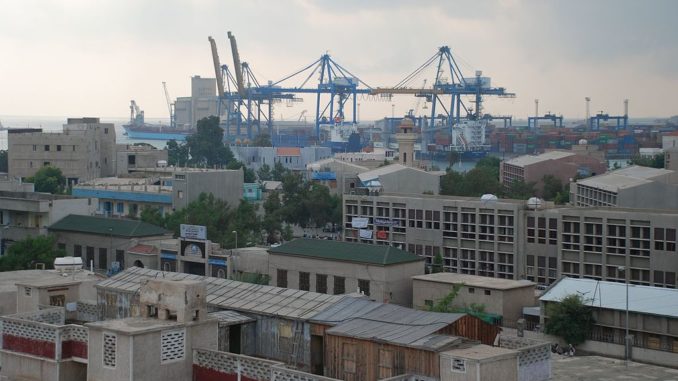
At this point, it remains uncertain if the Sudanese parliament will ratify the agreement on the Russian base in Port Sudan. Some Russian experts think the construction of a Russian military facility on the Red Sea is unlikely.
“Russia is not going to pay Sudan to host a base in Port Sudan,” said Dmitry Zakharov, head of the Eurasian Institute of Youth Initiatives. “Due to the unthinkable corruption in the African country, the Russian government has no desire to invest in such a project.”
Unlike the Kremlin, the United States seems willing to provide limited financial assistance to Sudan. On August 29, Sudan’s Ministry of Finance and the U.S. Agency for International Development (USAID) signed an agreement for a $5.5 million development grant to support “democratic transition” and to promote economic growth. This is part of a total estimated amount of $200 million to be granted by 2024.
Overall, it is Russia, rather than Sudan, that seeks to strengthen its geopolitical positions in the strategically important region. Thus, the coming days and weeks will show if Russia will adopt a more proactive approach regarding this sensitive issue. One thing is for sure: The naval base on the Red Sea would be just the first step in Russia’s ambitions plans to return to Africa, a region that has ceased to be in Moscow’s geopolitical orbit in the post-Soviet years.
Nikola Mikovic is a Serbia-based contributor to CGTN, Global Comment, Byline Times, Informed Comment, and World Geostrategic Insights, among other publications. He is a geopolitical analyst for KJ Reports and Global Wonks.
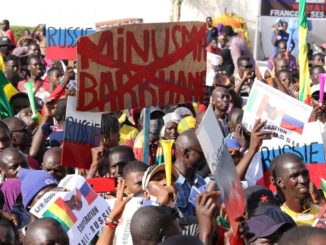
Why Protests Erupted in Mali, With People Demanding France Out and Thanking Russia for Support
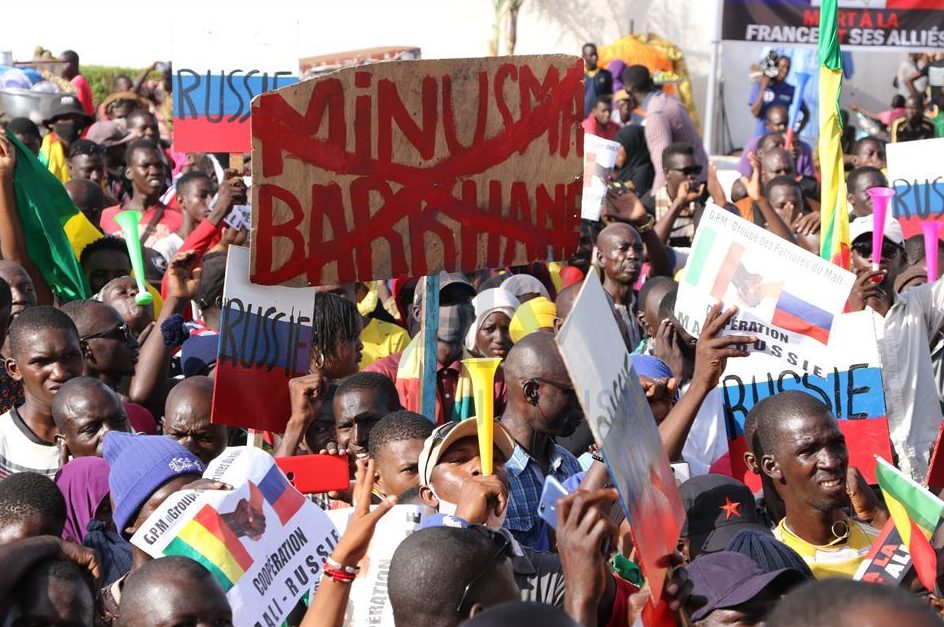
Editor’s Note: The following represents the writer’s analysis.
Thousands of demonstrators took to Mali’s streets on January 14 to demonstrate against sanctions the Economic Community of West African States (ECOWAS) imposed on the country after the military government’s supposed delay in the transitional map (plan) to transfer power to civilians. The military junta called for mobilizations throughout the country. Protests took place in the capital, Bamako. Other cities in the West African country also witnessed demonstrations, the most notable ones being in Timbuktu in the north and Bougouni in the south.
The former transitional president, Bah Andau, called on his compatriots to defend the homeland.
What is the general context in which these popular demonstrations took place? What are the positions of the actors in the crisis? How did international actors react, including France and Russia? And how is their position a reflection of the Malian authorities and the demonstrations?
Election Day Canceled
The beginning of the latest crisis started at the national conference—organized by the transitional government on January 2—which concluded its work in Bamako by adopting a recommendation to extend the political transition map for a period ranging from six months to five years.
The transitional government, led by President Asimie Goïta (also spelled Guetta), had approved an 18-month timetable, from the military coup carried out in August 2020 to elections that are supposed to be held this month.
Then the transitional government retracted that map, claiming the transitional phase needed to be elongated because the country had suffered from terrorist attacks that coincided with the coronavirus pandemic.
The ruling military council justified this change by saying it was unable to meet this month’s deadline, pointing to the continuing instability due to violence, in addition to the need to implement reforms, including that of the constitution. The hope was protests would not take off around the election, as had happened with previous elections.
At the huge protests in Mali, lots of protesters are waving Russian flags and holding posters that say "Mali-Russia cooperation" and "Thank you China and Russia for your support of Mali".
There are also lots of protesters carrying posters that say "Death to France and allies". pic.twitter.com/YPhaP5d0ZA
— Turtle (@swimming_free) January 17, 2022
Unprecedented Cruelty of ECOWAS Sanctions
After the recommendation to elongate the transitional period was issued and submitted to ECOWAS, it decided to hold a double special session of the Conference of the Heads of the West African Economic and Monetary Union. That is where ECOWAS imposed a set of sanctions on January 9, which included:
- closing the borders of ECOWAS member states with Mali,
- imposing a ban on trade (not including the trade of basic materials),
- imposing a ban on financial dealings with Mali,
- freezing Mali’s assets in West African banks, and
- summoning the ambassadors of member states to Bamako.
ECOWAS said the junta’s proposal to hold presidential elections in 2026 is “totally unacceptable” because it “means that an illegitimate transitional military government will hold the Malian people hostage over the next five years.” ECOWAS will only lift sanctions gradually, when Malian authorities present an “acceptable” timetable and when satisfactory progress is observed in its implementation.
These sanctions are more stringent than those imposed after the first coup in August 2020, which prompted observers to accuse the regional organization of unfairly applying economic and political sanctions for goals linked to foreign interests, France in particular. This is pertinent because ECOWAS did not impose the same sanctions on another West African country, Guinea, which witnessed a coup in September.
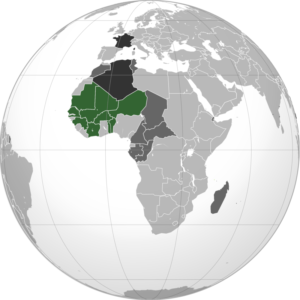
The strong French influence within the corridors of ECOWAS affects the independence of the organization’s decisionmaking. France colonized large portions of West Africa from the 1800s onward. Although West Africa gained independence and was split into sovereign states in the 20th century, France keeps a military presence in the Sahel region of West Africa and mandates many French-speaking African countries use the French currency, the franc, for transactions.
These sanctions would seriously affect the Malian economy, which is among the poorest in the world and has been experiencing a crisis stemming from terrorism and the pandemic. This is especially because the Republic of Mali is landlocked and depends on Senegal and the Ivory Coast to engage in trade. Consequently, these sanctions constitute a tremendous political and economic pressure on the country, exacerbating its worsening problems.
The Transitional Government Reacts
The government in Mali chose two parallel courses.
First, they rejected the sanctions and escalation in a strongly worded statement and recalled its ambassadors from ECOWAS countries, closed its land and air borders with them, and stated it would reserve the right to review its participation within ECOWAS bodies. The ECOWAS stated it did not take the situation in Mali into consideration before imposing sanctions, which Mali considered illegal, and not based on any legal basis regulating the work of the group. The sanctions also contradict ECOWAS’ objectives as an African regional organization aimed at achieving solidarity, and Mali expressed regret that the regional organization had become an “instrument in the hand of forces from outside the region have hidden plans,” an unmistakable reference to France.
Despite the harsh tone, Mali declared the door for dialogue is still open to reach a solution to the aggravating crisis.
The second trend has been to mobilize the street, which is rising in anger at France and its suspicious role in Mali, as well as at ECOWAS and its sanctions that disturb Malians’ lives. Surprisingly, these demonstrations denounced the French presence, and saw the French occupation as grounds for terrorist practices. Protesters declared in their slogans their support for Russia’s directions in support of their country’s cause. During the action, the demonstrators carried posters in which they thanked Russia and its efforts in Mali.
It is no secret the agenda that appeared in the rallies and popular demonstrations is the same as the agenda carried by the Goïta government, which no longer desires the support of the French colonizer. Rather, the government has accused France on more than one occasion of being a major supporter of terrorism in Mali, and therefore saw in the Russian presence a hope and a means that could be relied upon to get the country out of the security quagmire and reduce or end the suspicious French role.
It may be true these demonstrations came out in response to the call of the military, and that they protested against the despised French colonial presence, as well as denounced the penalties of ECOWAS. But it should not be taken for granted that their emergence lends a kind of legitimacy to the double military coup, as well as offers approval and acceptance of the five-year transitional map.
It is undoubtedly a long transitional period, at the end of which may only see an extended military rule, or a false civilian rule that covers for the military rule that holds the wheel of government.
These demonstrations ignited a wave of anger against French colonialism, as the Malian and general African community demonstrated in front of the Malian embassy in Paris, in support of the Malian government’s decision to reject the ECOWAS decisions. January 22 was dedicated to organize demonstrations in front of the French embassies throughout the world.
The World Reacts
The Malian military’s agenda, which the popular demonstrations supported, met with multiple international reactions. For example, French Foreign Minister Jean-Yves Le Drian said France and the Europeans, who are militarily involved in the fight against militants in the region, want to stay in Mali without any conditions.
The French Ambassador to the United Nations, Nicolas de Rivière, affirmed Paris’ full support for ECOWAS’ sanctions because Malian authorities did not respect ECOWAS demands and obligations in terms of a speedy return to the democratic process.
French anger in this context is understandable. It saw the Malian demonstrations and a hostile military that France did not expect and did not want. France fought against such a change in power for decades by passing whoever it deemed to be at its mercy into power, while suppressing and oppressing peoples with a tyrannical, dictatorial rule that hardly allows their voices to be heard.
However, Mali expelled the French ambassador on January 31, giving them 72 hours to leave the country.
As for Russia, it demanded an understanding of the position of the Malian authorities. The Assistant Russian Ambassador to the United Nations, Dmitry Polyansky, called during a meeting of the UN Security Council devoted to West Africa and the Sahel region, to show the necessary respect for the Republic of Mali and its efforts aimed at restoring order in the country, calling for an understanding of the difficulties they face. Without the return of the state’s authority to many regions of the country, it will not be possible to take into account the credibility of the election results, according to Russia.
The Russian position, consistent with the vision of the military government in Mali, rebuffs the Western presence that has begun to recede from Mali. It is a prelude to the expected Russian presence, whether in the form of security companies (Wagner) or direct support by Russian military forces.
These popular demonstrations may constitute the beginning of a real departure for the French colonialist and a decline in its role in West Africa. It may form the nucleus of a popular legitimacy that would constitute a lever for stable rule in the coming days.
Kribsoo Diallo is a Cairo-based Pan-Africanist researcher in political science related to African affairs. He has written for many African magazines and newspapers. Diallo has contributed to translated editions of papers and articles in Arabic and English for several research centers within the African continent.
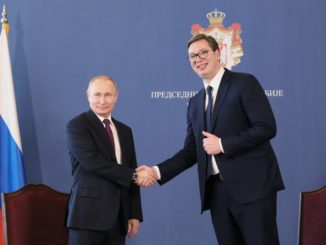
Sanctions Pressure Sticks Serbia Between Western Hammer and Russian Anvil
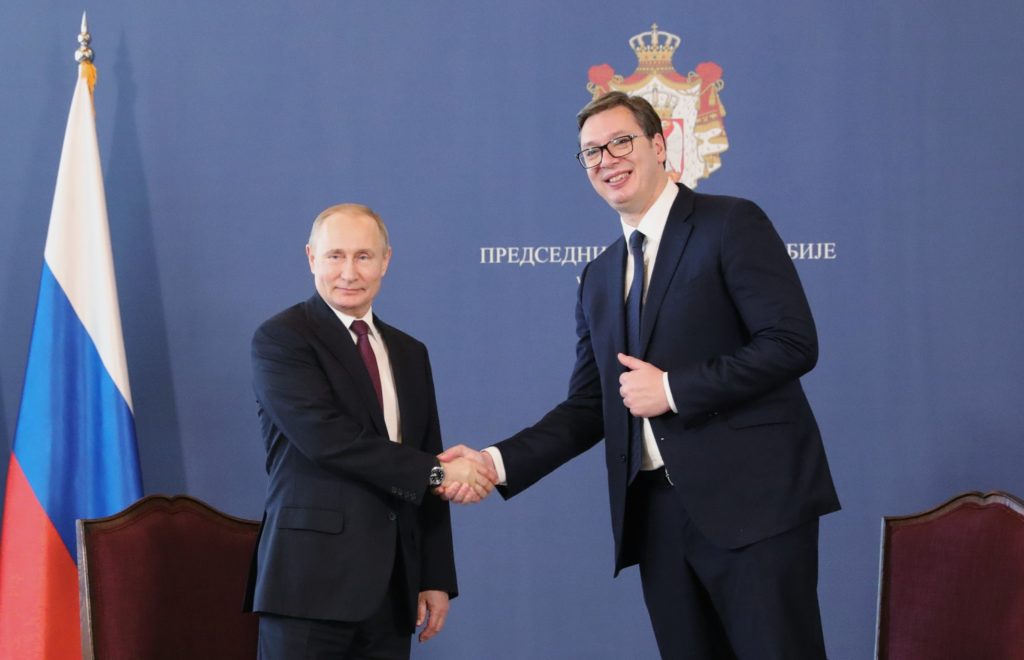
Only a handful of European countries have refused to impose sanctions on the Russian Federation after the United States called for them once Moscow’s “special military operation” in Ukraine began on February 24. Serbia is one such outlier. As a result, the West is pressuring the Balkan nation to change its foreign-policy vector and pick a side in the Russo-Ukrainian conflict.
Ever since the war in Ukraine broke out, Serbia has been trying to preserve its neutral position. Belgrade condemned the Russian invasion, but did not join in on anti-Russia sanctions. That led Moscow to keep Serbia off its list of “unfriendly countries.” That means the Balkan nation—unlike European Union members—can continue purchasing Russian natural gas and oil in U.S. dollars, rather than opening ruble accounts at Gazprombank, a privately owned Russian bank. The problem, however, is the EU could indirectly punish Serbia for not imposing sanctions.
According to reports, transport of crude oil from Croatia for Serbian oil corporation Naftna Industrija Srbije (NIS) will cease May 15 due to the EU’s sanctions against Russian companies. Russia’s Gazprom Neft owns 56.15 percent of shares, while the Serbian state owns 29.87 percent. The fourth package of EU sanctions prohibits European companies from cooperating with a number of Russian companies, including Gazprom Neft and its subsidiaries, in which Russia has more than 50 percent ownership.
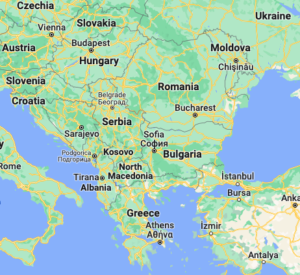
Getting Around Sanctions
What are Serbia’s options? According to Jelica Putnikovic, editor in chief of the Energija Balkana web portal, the alternative to oil supplies from Croatia is transporting crude oil by rail from the Adriatic ports of Durres in Albania and Bar in Montenegro, or by barge from the Greek port of Thessaloniki and the Black Sea port of Romania’s Constanța.
“It is, however, a longer and more expensive transport. The good thing is that Romania and Bulgaria still have not announced that they plan to impose similar sanctions on NIS, which opens the possibility for various oil deliveries to Serbia,” Putnikovic stressed in an interview with a Serbian publication. Her analyses show Serbia produces about 23 percent of its oil needs, while 45 percent of imports come from Iraq, 10 percent from Kazakhstan, 1 percent from Norway and about 16 percent from Russia. Russian gas is relatively cheap for Serbia. It costs $270 per 1,000 cubic meters, while gas prices broke all records at the end of February in Europe and reached $3,900 per cubic meters.
“For us, oil and gas supplies are the most important issues,” Vladimir Djukanovic, a Serbian lawmaker and the top official of the ruling Serbian Progressive Party (SNS) said in an interview with Toward Freedom. The SNS won the majority of parliamentary seats in elections held Sunday, and the party’s leader, Aleksandar Vucic has been re-elected for a second presidential term.
Djukanovic claims Serbia—despite strong pressure from the EU—does not intend to join anti-Russia sanctions.
“If the EU decides to impose energy sanctions on Russia, then we can think about joining sanctions,” Djukanovic added.
Despite sanctions, the EU continues to import Russian oil and gas, although it has radically cut economic ties with Moscow. Presently, the only European air corridor left open to Russia is via Serbia, which is now acting as a gateway. However, Air Serbia—the country’s national airline—has been facing anonymous bomb threats on an almost daily basis. “The author has expressed their dissatisfaction with Serbia’s diplomatic relations with Russia,” reported one news agency on an alleged threat.
“Serbia is politically very important to the West. The EU is not pressuring other European countries—namely Moldova, Georgia and Turkey—to impose sanctions on Russia, because those nations already pursue unfriendly and hostile policies toward Russia,” Djukanovic said. “We have good relations with Moscow, and they aim to portray us as an enemy of Russia.” He added Belgrade must preserve the military neutrality it declared in 2007 in response to the 1999 NATO bombing of Yugoslavia.
In spite of that, the Serbian Army cooperates with the United States’ Ohio National Guard. Moreover, according to Gabriel Escobar, the U.S. State Department’s deputy assistant secretary overseeing U.S. policy toward the countries of the so-called “Western Balkans,” Serbian Armed Forces have conducted far more military exercises with NATO members than with Russia.

Serbia’s Uncomfortable Position
But can Serbia really preserve its military neutrality? According to Serbian journalist and analyst Zeljko Pantelic, if Belgrade continues to insist on its “non-aligned” status, it risks cooling down relations with the EU.
“Brussels expects Serbia to harmonize its foreign policy with that of the EU,” Pantelic explained. “If Belgrade, however, attempts to destabilize the region at the expense of Russia, and agrees to be used as the Kremlin’s ‘useful idiot’, the consequences for Serbia will be serious.”
Serbian Parliament Speaker Ivica Dacic, on the other hand, insists imposing sanctions on Russia would be tantamount to “political suicide.”
“If we are ready to give up Kosovo, then we can impose sanctions on Russia,” Dacic said in an interview. “But if we are not ready, then we cannot.”
Indeed, Serbia relies on Russia’s veto power in the United Nations Security Council, as the only way to prevent the self-proclaimed Republic of Kosovo—which is the subject of a long-running political and territorial dispute between the Serbian government and ethnic Albanian Kosovo leaders based in the city of Pristina—from becoming a UN member state. Pantelic, however, believes Belgrade’s justification for not imposing sanctions on Russia because of Kosovo is ridiculous. “Only people acting in bad faith, or those who are total illiterates in geopolitics, can believe in it.”
For Serbia, energy cooperation with Russia plays a very important role—possibly even more important than the Kosovo issue—given the country, according to Vucic’s recent statement, depends 100 percent on Russian gas. Still, in Pantelic’s opinion, Serbia will have to carry out “de-russification” of the Kremlin-owned companies operating in the Balkan nation.
“Otherwise, Belgrade will de facto impose sanctions on itself, because Russian-owned companies in Serbia will not be allowed to do business with the EU,” Pantelic concluded.
One thing is for sure: If Belgrade joins anti-Russia sanctions, or decides to nationalize NIS, relatively cheap Russian gas will become a thing of the past.
Nikola Mikovic is a Serbia-based contributor to CGTN, Global Comment, Byline Times, Informed Comment, and World Geostrategic Insights, among other publications. He is a geopolitical analyst for KJ Reports and Enquire.
